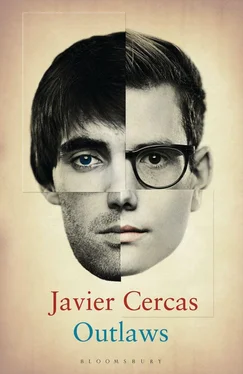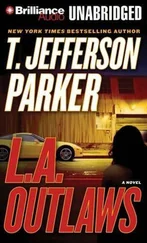‘It took still more effort, but finally, with Tere’s help, María ended up saying yes, and that very Saturday I got down to work. I had lunch with my daughter, who for weeks hadn’t stopped asking me about my new squeeze (which is what she called Tere, not knowing her name), reproaching me for not introducing her and making fun of the traces of her having been in our house (I’m not surprised you don’t want to introduce her to me, she said when she noticed the shelves in the dining room were starting to fill up with CDs of seventies and eighties music. What an old square she must be), and in the afternoon went into the office to draft a request for a cumulation of sentences and prepare a sketch of a script to discuss with Zarco and then present to María. On the Monday I asked Cortés and Gubau to read the request for the sentences to be served concurrently, finished polishing it up and had it sent to the court in Barcelona, and at about four, with my sketched-out script in hand, I went to visit Zarco. I spent almost the whole afternoon with him. I told him that María and Tere had agreed to my plan and he said he knew that already: María had told him that weekend. I explained that as I envisioned it, the campaign for his freedom would be like a piece of theatre in which María would play the starring role on the stage and we would be the directors in the wings. And Tere? asked Zarco. Tere would be the assistant director, I answered. I don’t know if Zarco knew what an assistant director did, but he seemed satisfied with my reply. Then he took a couple of folded pieces of paper out of his back pocket and told me to call the duty guard so he could give them to me. The guard appeared immediately, unlocked the little paper-passing drawer and I took the pages and had a look at them: it was a long list of names and phone numbers of journalists and personalities who’d had something to do with Zarco at some point or had been interested in his case and who, according to him, I could ask for help. Thanks, I said, putting the pages away. These are going to be very useful; but not yet. Zarco’s brow crinkled. This time things have to be done differently, I explained. We won’t start at the top but from the bottom. I reasoned that, for the national media, he practically didn’t exist; for the local media, however (as we’d seen from the hearing for the last trial), he was still someone, so first we’d have to fully reactivate his figure in the local media and turn him back into a cause, in order to later be able to claim the attention of the national media.
‘Zarco watched me curiously, a little surprised, but he didn’t protest, so I deduced that the surprise was a welcome one and that he approved my strategy, and we devoted the rest of my visit to discussing the script that should guide María’s public remarks. In the end, what we prepared was more of a sales pitch than a script, an arsenal of laments, good intentions and reasoning saturated with philanthropic and sentimental clichés, accompanied by something like an instruction manual. According to the pitch, Zarco was a generous and noble person, condemned by the chance circumstances of his birth to a life of criminality, who had spent half his life behind bars without ever having spilled any blood and who had more than paid for his missteps, had matured and learned from his mistakes; in short, Zarco was no longer Zarco but Antonio Gamallo, a man with whom María, a good, simple, unlucky woman, had fallen in love, and it was a love that had overcome all obstacles and would give her and her daughter the husband and father they deserved, and Zarco the family he’d never had and a free and decent future. That was the sales pitch; the instructions that went with it said more or less the following: so that María and Zarco could be married as soon as the prison authorities granted him leave, María should request a partial pardon from the government and, in order to achieve that, she needed to gather the maximum number of signatures in support of her request; for that reason, in all her public appearances María would request support for her cause from readers, listeners or spectators, who should send their signatures to the address that María herself would give them during the interview, an address that would be that of my office, thus converted into a sort of general headquarters of the campaign for Zarco’s freedom.
‘That was in short what Zarco and I agreed that afternoon at the prison. The next day I summoned María to my office, explained it to her and gave her some notes and an outline. I like it, she said, once she’d heard me out and had read the notes and outline. It’s the absolute truth. I’m glad, I said, knowing that at least fifty per cent was absolute lies. But what matters is not that it’s true, but that it’s convincing. And that’s where you come in. I’m going to get you a couple of interviews this week. Do you want us to rehearse what you’re going to say? No need, said María, brandishing the papers I’d just given her. If you and Tere come with me, I have enough with what it says here. Are you sure? I asked, surprised by her new self-assurance. I think so, she answered.
‘She wasn’t short of reasons to be. During that week I met separately with two journalists from two local papers: El Punt and Diari de Girona . Both owed me favours, I explained to both of them that I’d taken on Zarco’s defence and asked them to interview María who would describe Zarco’s current situation and give them a new point of view on his character; both their reactions were predictable, identical: a mixture of scepticism, pity and irritation, as if I were trying to sell them some fourth-hand merchandise. I had to do my utmost. I reminded them of the favours they owed me, promised to make it up to them, appealed to the human dimension of the matter, praising María and her efforts to get Zarco out of jail, the populist dimension, exaggerating the turnout of journalists and public at Zarco’s last trial and finally the political dimension: the Catalan government had taken over responsibility for prisons within the region years before, and I predicted that what left-wing Madrid centralism hadn’t been able to achieve in Zarco’s case conservative Catalan nationalism was going to be able to do.
‘That was enough. The two interviews took place on the Friday in my office; just as we’d promised María, Tere and I sat in on them, Tere in her capacity as María’s friend, I in my capacity as Zarco’s lawyer. And that’s when we got a surprise. The surprise was María, who not only told her story to the journalists, but she unfurled the arguments Zarco and I had prepared so naturally and with such surprising eloquence, and on top of that played with absolute conviction the role of the righteous woman in love ready to do anything to liberate her man, fulfil her love and protect her family. As I witnessed that spectacle I remembered Zarco’s phrase again, and only then did I begin to suspect that it contained, as well as a serious and not an ironic opinion, an opinion that was spot on. You can’t imagine how pleased I was.
‘Both interviews were published that Sunday and were a success: both were given a whole page; both used quotes of María’s as headlines, in which she protested against the injustice being committed against Zarco; although obviously the journalists had not agreed to describe her this way, both called María — one in a subtitle, the other in the lead-in to the article — “a woman of the people”, and neither of them hid the sympathy she inspired. These two simultaneous interviews managed to call attention to María, who the following week spoke to a couple of local radio stations and a regional magazine that put her on the cover that same month. It was just the beginning. Then came the Catalan newspapers, radio and television stations, then the newspapers, radio and television stations from the rest of Spain, so that in just a few months Zarco recovered a notoriety he hadn’t enjoyed for many years, as if instead of being forgotten he’d been asleep and the country waiting for him to wake up. It was María who achieved this remarkable feat, not Zarco. This woman is full of surprises, I’d say to Tere every time we saw each other at my place. I told you María just wanted to get into the magazines, Zarco told me every time we saw each other at the prison. For some time people racked their brains trying to figure out what turned María into what she turned into. I don’t know; I can only repeat that none of what happened later was planned in advance, and that I was the first one to be surprised by that woman, who initially seemed terrified at the thought of facing a journalist, from one day to the next turning out to be imperious and feeling right at home in front of a microphone. In the press interviews her capacity for seduction was extraordinary, but on the radio and television, where she expressed herself without intermediaries, the effect she produced was devastating: at times María spoke with the sadness of a wounded little girl, at times with the fury of a mother whose children someone was trying to take away, at others with the wisdom of an old woman who had known love, poverty and war. But it wasn’t just what she said and how she said it; on the radio and television María spoke also with her voice, her gestures, her glances, her way of dressing, and all this went into composing an irrefutable personality who began to draw the attention of many and with whom many began to identify: an average woman able to transfigure herself to the point of being invested with the greatness of an ancient heroine or a modern Pietà, and consequently able to convince anyone that such greatness was also within their reach. Furthermore, the fact of that kind of woman — a wounded, honest, valiant mother — being in love with and engaged to Antonio Gamallo allowed people to imagine that Zarco no longer existed and that Gamallo was just an ordinary man with an exceptional past who deserved an ordinary future.’
Читать дальше












